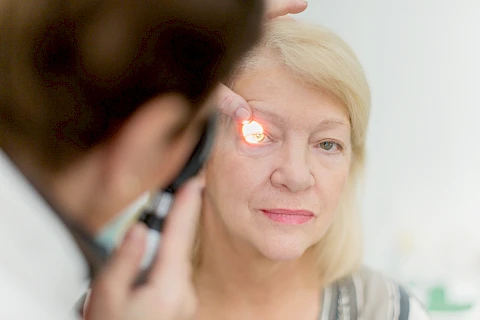
August is National Eye Exam Month, a crucial reminder for everyone, especially seniors and their caregivers, to prioritize eye health. As we age, our eyes become more susceptible to various issues that can significantly affect our quality of life. Senior Helpers guides caregivers to recognize common eye problems in older adults and understand how regular eye exams help with early detection and effective treatment.
Common Eye Issues in Seniors
Here are a few eye conditions that older individuals are more susceptible to:
Cataracts
Cataracts occur when the eye's lens becomes cloudy, leading to vision impairment. They develop slowly over time due to aging. However, they can also be influenced by factors like smoking, diabetes, and prolonged exposure to sunlight.
Symptoms to watch for include blurred or hazy vision, difficulty seeing at night, sensitivity to light and glare, seeing "halos" around lights, and a faded or yellowish tinge to colors. Cataracts can be treated effectively with surgery. The cloudy lens is replaced with a clear artificial one, often restoring vision to near-normal levels.
Glaucoma
Glaucoma is another serious eye condition that seniors need to be aware of. It involves damage to the optic nerve, often due to high pressure in the eye, which can lead to vision loss. The primary cause of glaucoma is increased intraocular pressure, but other factors such as genetics, age, and certain medical conditions like diabetes can also play a role.
Symptoms to watch for include patchy blind spots in peripheral or central vision, tunnel vision in advanced stages, eye pain or redness, nausea and vomiting, and blurred vision. While there is no cure for glaucoma, early detection is crucial. Treatment usually involves prescription eye drops, oral medications, laser treatment, or surgery to lower eye pressure and prevent further damage.
Age-Related Macular Degeneration (AMD)
Age-related macular degeneration (AMD) is a common eye issue that affects the central part of the retina and can lead to vision loss. AMD is often age-related and affects people over 50. Factors such as smoking, high blood pressure, and a family history of AMD can increase the risk.
Symptoms to watch for include blurred or distorted vision, difficulty recognizing faces, straight lines appearing wavy, dark or empty in central vision, and the need for brighter light for close-up tasks. While there's no cure for AMD, treatments like anti-VEGF injections, laser therapy, or vitamins and supplements can slow the progression of the disease and help manage symptoms.
Why You Need Regular Eye Exams
Regular eye exams are necessary for the early detection and prevention of these common eye issues. Eye exams can uncover problems before symptoms appear, allowing for immediate intervention. Issues like glaucoma and AMD can progress without noticeable symptoms, making regular check-ups vital.
Seniors should have comprehensive eye exams at least once a year. This helps track changes in vision and spot potential problems promptly. Caregivers play a critical role in encouraging and facilitating regular eye exams for seniors. They can help schedule appointments, provide transportation, and support adherence to treatment plans.
Senior Helpers Tallahassee Supports Senior Eye Health
Cataracts, glaucoma, and age-related macular degeneration are common eye issues that can significantly impact seniors' quality of life. Recognizing the symptoms and understanding the importance of regular eye exams can make a big difference in early detection and treatment.
Don't wait; schedule an eye exam today to ensure your loved one's eye health is in check. For compassionate and professional assistance in Tallahassee, Crawfordville, Monticello, and Madison, contact us at Senior Helpers Tallahassee. We're here to support you and your loved one's well-being.